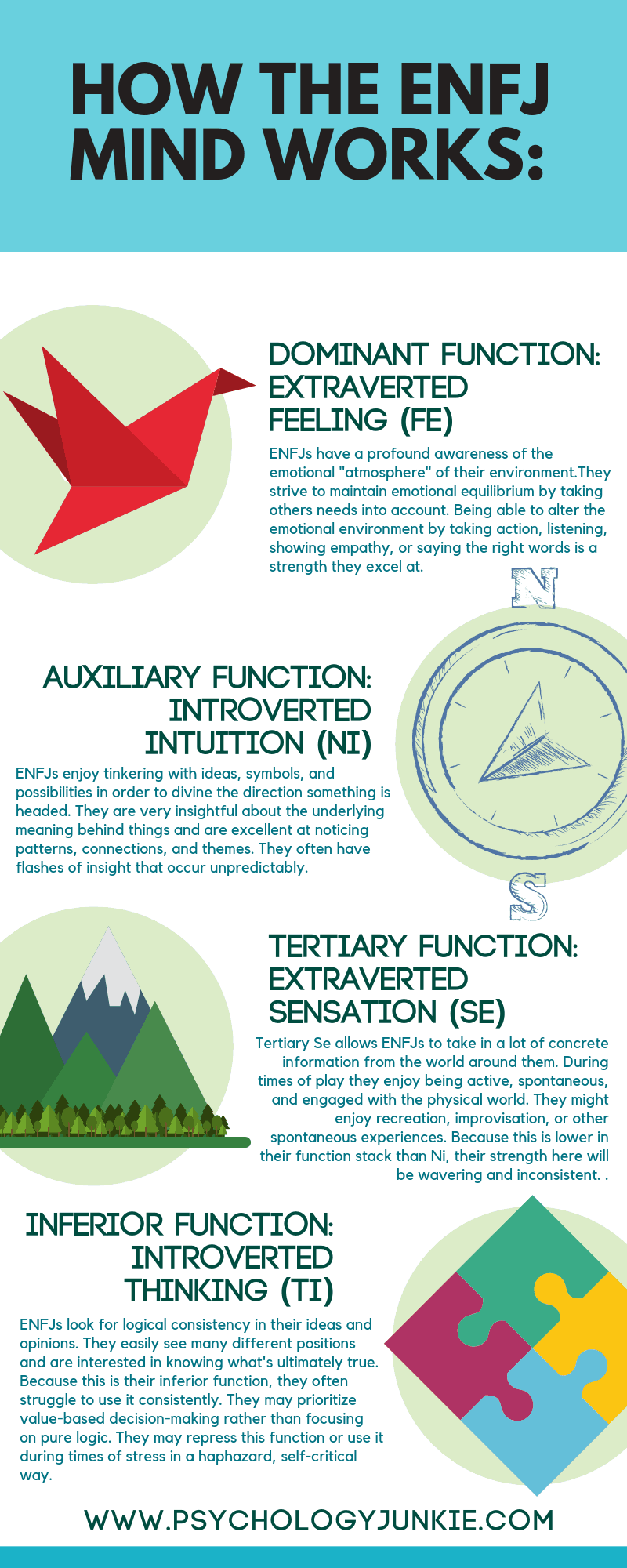A Look Inside the ENFJ Mind
Last week we delved deep into how the INFJ mind works, and this week we’re going to explore the ENFJ mind. What does it really feel like to be an ENFJ? What are the highs and lows of being this personality type? Let’s find out!
Note: This article contains an affiliate link. I only recommend books I truly love and believe in.

Not sure what your personality type is? Take our new personality questionnaire!
The ENFJ Mind in More Detail
Dominant Mental Process – Extraverted Feeling
From the infographic: “ENFJs have a profound awareness of the emotional “atmosphere” of their environment. They strive to maintain emotional equilibrium by taking others’ needs into account. Being able to alter the emotional environment by taking action, listening, showing empathy, or saying the right words is a strength they excel at.”
As an ENFJ you feel a strong sense of social responsibility. You believe that it’s your job to maintain morale and improve the well-being of the environment you are in. You always have a finger on the emotional pulse of the environment you are in. You use communication, analysis, and action to maintain equilibrium or a particular emotional “vibe.” You are focused on values, ethics, and social action. You probably feel responsible for the world around you and take it upon yourself to help the people in your family, workplace, or friend group. You can be very proactive when it comes to motivating people, initiating change, and standing up for social progress.
Dario Nardi, a neuroscience expert, and professor at UCLA, says that ENFJs “often show brain activity that reflects their focus on social responsibility. They use neocortex regions that help them communicate, evaluate others’ behavior, plan for the future, and analyze complex problems.” (Neuroscience of Personality)
Nardi also explained that ENFJs show high activity in brain regions that help them to adjust to social feedback. When you’re talking to someone and you get a reaction, especially a negative one, you probably feel intensely embarrassed, ashamed, or reactive. That’s literally how your brain is wired, and it’s something that all Feeling-Judging personality types tend to struggle with. You probably take criticism very personally, especially if it is given with negative emotion. Friendly criticism that also acknowledges your strengths is much more palatable, especially because you’re probably always trying to be a better person.
Extraverted Feeling tends to make you:
- Nurturing
- Tactful
- Skilled at peacemaking
- Able to maintain social structures, standards, and conventions
- Skilled at speaking up for people in need
- Aware of the personal values of others
- Responsible for your surroundings
- Conscious of other people’s needs and reactions
Auxiliary Mental Process – Introverted Intuition (Ni)
From the infographic: “ENFJs enjoy tinkering with ideas, symbols, and possibilities in order to divine the direction something is headed. They are very insightful about the underlying meaning behind things and are excellent at noticing patterns, connections, and themes. They often have flashes of insight that occur unpredictably.”
As an ENFJ, you absorb abstract information more than concrete information. What does this mean? You notice meanings, connections, themes, and patterns more than you notice what’s actually right in front of you. Instead of looking at an apple and seeing it for its nutritional value, shape, size, or color, you might think of it as a symbol of life, of original sin, of apple pies that bring people harmoniously together in the fall. The ideas that the apple provoke are more significant than the technical details of the apple. You are always trying to understand the “background processes” at work in any situation. What isn’t being said? What are the true intentions of the people around you? What long-term impact will this event or situation have on the future? You tend to get epiphanies or “flashes” of insight into a situation that reveal themselves sporadically and unexpectedly.
This mental process tends to make you:
- Imaginative
- Creative
- Insightful
- Strategic
- Visionary
- Able to see context quickly
- Connected to the intangible world
Tertiary Mental Process: Extraverted Sensation (Se)
From the infographic: “Tertiary Se allows ENFJs to take in a lot of concrete information from the world around them. During times of play, they often enjoy being active, spontaneous and engaged with the physical world. They might enjoy recreation, improvisation, or other spontaneous experiences. Because this is lower in their function stack than Ni their strength here will be wavering and inconsistent.”
The tertiary mental process often feels refreshing and enjoyable for you to access. This function (Se) is all about gathering concrete information and facts from the world around you. It’s about acting on the immediate moment and doing the most resourceful thing. Se-dominant types (ESxPs) are usually very active, energetic, and spontaneous – using whatever is in their current environment to maximize opportunities. As an ENFJ you experience this function with wavering strength – it’s not one you value as highly as intuition. Simultaneously, when you’re feeling relaxed and playful this process tends to come into play. You might find yourself being very observant of what’s around you, the tangible details, and the opportunities. You might randomly become spontaneous and pursue a daring opportunity or thrilling risk. You can be very opportunistic and actionable – at your best you combine this process with intuition to act strategically and to be realistic as well as insightful and imaginative.
In the tertiary position, extraverted sensing can make you:
- Motivating
- Actionable
- Occasionally spontaneous
- Observant
- Aware of realities, relevant data, and facts
Over-reliance on Extraverted Sensing can make you:
- Overly-impulsive
- Hasty
- Overly pleasure-seeking
Inferior Mental Process: Introverted Thinking (Ti)
From the infographic: “ENFJs look for logical consistency in their ideas and opinions. They easily see many different positions and are interested in knowing what’s ultimately true. Because this is their inferior function, they often struggle to use it consistently and well. They may prioritize value-based decision-making rather than focusing on pure logic. They may repress this function or use it during times of stress in a haphazard, self-critical way.”
As the inferior mental process, Ti can make you feel excitable as well as nervous or self-conscious. You aspire to use this process well, but it tends to trip you up. You may also de-prioritize this function, seeing it as less valuable than your dominant function, Extraverted Feeling (Fe). In a healthy state, you use Ti to balance Fe. You can use objective logic to support your plans, efforts, and interactions with people.
Ti often shows up for ENFJs in times of stress. Because you naturally rely on Fe and Ni, this function is often ignored. If you’re over-worked, ill, or experiencing extreme stress, Ti might “take the wheel” and show up more prominently. You might find yourself suddenly acting out-of-character; more critical, fault-finding, or stuck in a kind of “analysis paralysis.” These are all stages of “Ti grip” that happen during chronic or extreme stress. You can find out more about stress (and get solutions) here: What ENFJs Do When They Get Really Stressed Out.
Introverted Thinking is focused on finding underlying truths and principles and organizing them into categories and systems based on logical analysis. It’s more focused on impersonal logical evaluation and what makes sense to one’s self rather than meeting the needs of the group (like Fe). Because Ti is still one of your main mental processes you probably find yourself analyzing the logic of your own feelings. “Does this make sense? Is this really true?” You might filter information through a series of filters, refining it until you know what’s really accurate – discarding biases and other “fluff” that gets in the way of knowing what’s essentially true. When you’re stressed you might feel like you’re doing this to an extreme degree – you might feel like you can’t make sense of your own feelings, or that you need to talk them out or externalize them to see if they make sense. This is all normal for an ENFJ. It’s a way of combining Fe with Ti.
Inferior Introverted Thinking can make you:
- More inwardly analytical than people realize.
- Nervous when having to critique something impersonally based on logic
- Slow to work through the logic of your opinions and thoughts
- Prone to random “quests for truth” to solve problems or learn about a topic
- Organize knowledge into a pre-existing, systematic format
- If you suppress/ignore this function for too long you can have a biased judgment or be oversensitive to criticism.
What Are Your Thoughts?
Do you have any thoughts or insights you’d like to share with us or other ENFJs? Let us know in the comments!
Find out more about your personality type in our eBooks, Discovering You: Unlocking the Power of Personality Type, The INFJ – Understanding the Mystic, and The INFP – Understanding the Dreamer. You can also connect with me via Facebook, Instagram, or Twitter!
Learn More About Your Personality Type:
7 Ways That ENFJs Make an Impact
The Shadow of the ENFJ Personality Type
10 Things You’ll Relate to if You’re an ENFJ
The Top 7 Gift Ideas for ENFJs
10 Things You Should Never Say to an ENFJ











7 Comments